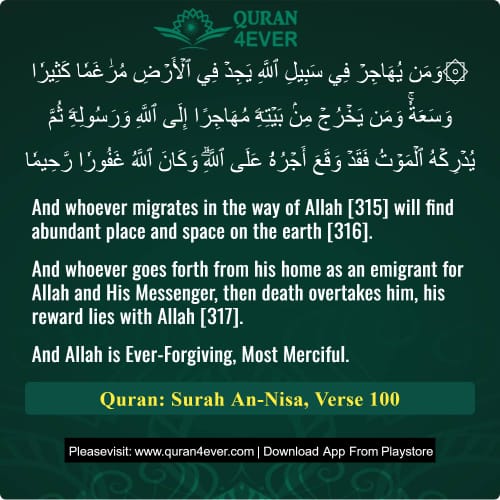
Transliteration:( Wa mai yuhaajir fee sabeelil laahi yajid fil ardi muraaghaman kaseeranw wa sa'at; wa mai yakhruj mim baitihee muhaajiran ilal laahi wa Rasoolihee summa yudrik-hul mawtu faqad waqa'a ajruhoo 'alal laah; wa kaanal laahu Ghafoorar Raheemaa )
“And whoever migrates in the way of Allah [315] will find abundant place and space on the earth [316]. And whoever goes forth from his home as an emigrant for Allah and His Messenger, then death overtakes him, his reward lies with Allah [317]. And Allah is Ever-Forgiving, Most Merciful.”
The phrase “whoever migrates in the way of Allah” primarily refers to the migration from Makkah to Madinah, during the time when Hijrah (migration) was a divine obligation upon the believers.
At that time, this promise applied specifically to the Muhajireen (emigrants).
If someone migrates later and doesn’t find worldly ease, it does not contradict this verse. Allah had already fulfilled His promise to the original emigrants of Makkah.
The phrase “abundant place and space” refers to the ease, freedom, and prosperity granted by Allah to the emigrants in Madinah.
This was not a promise for all times, but for that specific phase in Islamic history.
We also learn a spiritual lesson here:
When an act of worship (such as migration) is done with the intention to please Allah and His Messenger ﷺ,
it is strengthened and rewarded greatly—
and this intention does not constitute shirk (polytheism).
Thus, even though migration is for Allah, the mention of the Prophet ﷺ amplifies its virtue and sincerity.
This verse was revealed about Hazrat Junda’ bin Dameera Laithee, an elderly man who, upon hearing the previous verse, declared:
“I am wealthy and capable of migration. I do not fall among the disabled. I will not stay one more night in Makkah.”
Due to his weak condition, he was carried on a bed during the migration. Upon reaching a place called Na’eem, the signs of death appeared.
Placing his left hand in his right, he said:
“O Allah, this is my hand in the hand of Your Messenger ﷺ. I pledge allegiance as I did to him.”
He passed away right then.
Intentions carry reward – Whoever intends a pious deed but is unable to complete it due to valid reasons, will still receive full reward.
Migration also includes journeys for:
Seeking religious knowledge
Performing Hajj
Visiting Madinah
Earning halal sustenance
All these are included in “migration in the way of Allah.”
In critical moments, symbolic allegiances (like Hazrat Junda’s gesture) are valid and accepted.
A person who dies while studying the Qur'an, or while pursuing Islamic knowledge, will be raised among the scholars and Huffaz on the Day of Judgement.
At that time, residing in Makkah without valid reason was prohibited, despite its sanctity, because the Prophet ﷺ had migrated. Therefore, leaving Makkah was an act of worship, and staying behind was blameworthy.
This highlights that the presence of the Prophet ﷺ is the soul and beauty of every sacred place.
The tafsir of Surah Nisa verse 100 by Ibn Kathir is unavailable here.
Please refer to Surah Nisa ayat 97 which provides the complete commentary from verse 97 through 100.
(4:100) He who emigrates in the way of Allah will find in the earth enough room for refuge and plentiful resources. And he who goes forth from his house as a migrant in the way of Allah and His Messenger, and whom death overtakes, his reward becomes incumbent on Allah. Surely Allah is All-Forgiving, All-Compassionate.[131]
131. It should be understood clearly that it is only permissible for a person who believes in the true religion enjoined by God to live under the dominance of an un-Islamic system on one of the following conditions. First, that the believer struggles to put an end to the hegemony of the un-Islamic system and to have it replaced by the Islamic system of life, as the Prophets and their early followers had done. Second, that he lacks the means to get out of his homeland and thus stays there, but does so with utmost disinclination and unhappiness.
If neither of these conditions exist, a believer who continues to live in a land where an un-Islamic order prevails, commits an act of continuous sin. To say that one has no Islamic state to go to does not hold water. For if no Islamic state exists, are there no mountains or forests from where one could eke out a living by eating leaves and drinking the milk of goats and sheep, and thus avoid living in a state of submission to unbelief.
Some people have misunderstood the tradition which says: ‘There is no hijrah after the conquest of Makka’ (Bukhari, ‘Sayd’, 10; ‘Jihad’, 1, 27, 194; Tirmidhi, Siyar’, 33; Nasa’i, ‘Bay’ah’, 15, etc. – Ed.) This tradition is specifically related to the people of Arabia of that time and does not embody a permanent injunction. At the time when the greater part of Arabia constituted the Domain of Unbelief (Dar al-Kufr) or the Domain of War (Dar al-Harb), and Islamic laws were being enforced only in Madina and its outskirts, the Muslims were emphatically directed to join and keep together. But when unbelief lost its strength and elan after the conquest of Makka, and almost the entire peninsula came under the dominance of Islam, the Prophet (peace be on him) declared that migration was no longer needed. This does not mean, however, that the duty to migrate was abolished for Muslims all over the world for all time to come regardless of the circumstances in which they lived.

For a faster and smoother experience,
install our mobile app now.
Related Ayat(Verses)/Topics